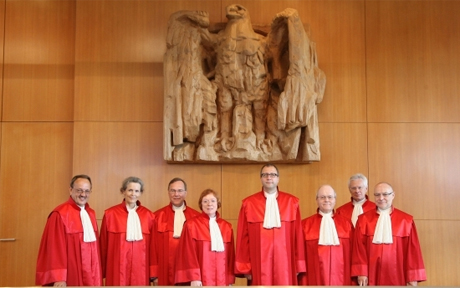 When French and Dutch voters were given an opportunity to vote for the European constitution in 2005, which would have transferred considerable sovereignty from their countries to the European government and its unelected bureaucrats, they ?unexpectedly? killed it. They wanted to hang on to their sovereignty. An unforgettable lesson for European politicians: don?t let the riffraff decide. Such matters are best handled by the elite?politicians, bankers, and unelected bureaucrats. And on Wednesday, they were busy handling such matters.
When French and Dutch voters were given an opportunity to vote for the European constitution in 2005, which would have transferred considerable sovereignty from their countries to the European government and its unelected bureaucrats, they ?unexpectedly? killed it. They wanted to hang on to their sovereignty. An unforgettable lesson for European politicians: don?t let the riffraff decide. Such matters are best handled by the elite?politicians, bankers, and unelected bureaucrats. And on Wednesday, they were busy handling such matters.
In the morning, Andreas Voßkuhle, President of the German Constitutional Court, announced that two of the main Eurozone survival strategies, the ESM bailout fund and the Fiscal Union treaty, would ?most likely? not violate the constitution (press release, flash analysis). By rejecting the plaintiffs? efforts to block the laws, the Court allowed Federal President Joachim Gauck to sign them; and they?d become binding international treaties.
Thus, the Court nodded with a stern smile on the transfer of sovereignty from parliament to unelected bureaucrats within the European Union government. For the fifth time?after waving through the EFSF bailout fund in 2011, the Lisbon Treaty in 2009, the introduction of the euro in 1998, and the Maastricht treaty in 1993. Each time, it added conditions that gave plaintiffs a pretext to proclaim victory and try again next time. True to form, Peter Gauweiler (CSU), one of the most vocal plaintiffs, called the decision a ?giant success? and ?legal sensation?; the conditions would make it more difficult to turn ?the ESM into a bottomless barrel,? he said.
Chancellor Angela Merkel slapped herself on the back, complemented the justices??The Court goes the way that also guided me,? she said?thanked those who?d supported her, including the opposition SPD and Greens, and told the rest of the world that Germany was carrying its share of the load. Alas, in a poll last week, 54% of those who?d be carrying that load wanted the Court to stop the ESM and Fiscal Union treaty. Only 25% wanted the Court to wave them through.
And then the noose tightened further on national sovereignty in Europe, and particularly in the Eurozone. Michel Barnier, European Commissioner for Internal Markets and Services, hammered home his plan to create a supranational banking supervisor with a bank bailout fund and a deposit insurance fund, under the ECB. It would not only cover the 25-30 systemically important Eurozone banks, the TBTF banks that could take down the world, or worse, presumably, but all 6,000 Eurozone banks, down to small savings banks. A centralized banking supervision would have to have the right to act ?in any imaginable situation and in any bank,? he said, citing non-systemically important banks that had collapsed: Northern Rock, Bankia, and Dexia [read…. Belgians Get Cold Feet As Bailout Queen Dexia Drags Them Toward The Abyss].
The power grab hit resistance in Germany. Finance Minister Wolfgang Schäuble only wants to put TBTF banks under centralized control. The Bundesbank, citing conflicts of interest, doesn?t think the ECB should become the regulator of banks it funds. And the Association of Savings Banks came out against allowing the ECB to supervise savings banks. It would use their contributions to prop up banks in debt-sinner countries and through that transfer make savings banks less secure. Also, tottering banks could go directly to the ECB to get their bailout funds, rather than the ESM, with all its irksome conditions and parliamentary votes. But resistance will be whittled down over time. And in the end, it won?t change the principle that bankers regulate bankers for the benefit of bankers.
Unelected European Commission President José Manuel Barroso chimed in with his state of the union speech to the European Parliament?not only calling for a centralized banking supervisory and bailout mechanism, but for a ?quantum leap? in every other aspect of centralizing governance in Europe to form a ?federation of nation states.? His grandiose plans weren?t just for the 17-member Eurozone but for the 27-member European Union, which includes the UK, whose people have been, how shall we say, reluctant to hand over sovereignty to European bureaucrats.
The European Commission would doctor up the plans, in coordination with European Council President Herman Van Rompuy, another unelected honcho, and would present it to the European Parliament, an emasculated institution that cannot do what other parliaments can do, namely initiate legislation; it can only vote on legislation initiated by the Commission or the Council.
But there would be more democracy, Barroso promised, including an elected president. An incentive for all politicians in Europe to go along with the power grab. It would give them a higher level of government to move up to, one with more power. They all must be thinking about it, Merkel, Schäuble, French President François Hollande, Nicolas Sarkozy…. Well, on second thought, maybe not him.
France is mired in a stagnating economy. The private sector is under pressure, auto manufacturing in a depression, unemployment at a 13-year high. Youth unemployment is catastrophic in ghetto-like enclaves. Gasoline prices are near record highs. So there are a lot of very unhappy campers. And it could turn ugly. Read…. The French Government Gets Whacked, Even The Left Is Angry, And Hollande Gets Slapped In The Face.
The media are falling all over themselves to celebrate the German Constitutional Court’s acquiescence to the ESM and the Fiscal Pact; the building blocks are now in place for the establishment of a “Federation of European States,” European Commission President Barroso?s pipedream. The Euro debt crisis is finally resolved. But did the justices really give up the ghost? Read…. The German Constitutional Court Torpedoes The ECB?s OMT, by Blankfiend.



